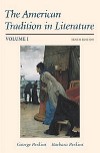"Bartleby, The Scrivener" first appeared in the November-December, 1853 issue of Putnam's Magazine and later republished Melville's Piazza Tales (1856). Taken into a legal firm as a copyist by the unnamed narrator of the story, Bartleby, at first an officious copier within a team of three, suddenly refuses to perform the simplest of tasks, the review of a document for his attorney boss. From that point, Bartleby declines every command or request with the same response, "I would prefer not to." Related in the voice of the head of the law firm, the story follows Bartleby's physical expulsion from the office, onto the streets, and eventually into the squalid cells of prison. Critical to the understanding of the story's complex of meanings is the gradual shift in attitudes on the part of the narrator who comes to champion his eccentric scrivener. Melville was in the process of his editing the manuscript for Billy Budd, Sailor, when he died in 1891. In contrast to the themes of Moby Dick, this novelette reconciles some of Melville's most poignant insights into "man's inhumanity to man," identified in his earliest experiences on the high seas and later in the United State Navy. As such, this closing work, exhibiting some of Melville's finest skills as a writer, testifies to the remarkable richness and complexities of the American author's insight into human nature. |



 2003 McGraw-Hill Higher Education
2003 McGraw-Hill Higher Education